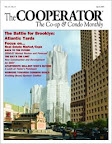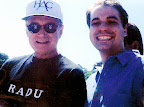
Kids Called to Make a Difference
Library Hosts Anti-Bullying Discussion
Program coordinators feel students hold key to reducing alarming bullying rates
By DW. DUNPHY
The headlines are worrisome. Reports of students being targeted by other students brought to the point of suicide and murder. Names like Tyler Clementi and Phoebe Prince have become symbols of a system that has neither connected to those at risk, nor those liable to take part in such actions.
New York-based educators from Peace Dynamics Consultants, George S. Anthony and Lindy P. Crescitelli brought their presentation entitled "Stand Up and Lead" to the Middletown Township Public Library on Monday night. Their goal was not to offer feel-good, anti-bullying rallies, but rather to offer a more substantive alternative.
“Children are not just the leaders of tomorrow, they’re the leaders of today,” said Anthony. Crescitelli then used the example of the child in the mall who is acting out. It is a scenario he feels everyone has seen and can relate to since that child not only affects their parents, but others within the viewing and listening perimeter as well. Anthony and Crescitelli then ask if that same persistence could be used in positive ways, which is the foundation of their Stand Up and Lead concept. It's a matter of channeling. They profess them as leaders in a mindset wherein their actions and communication can have a positive, rather than negative influence on their external situations.
For Anthony the impetus for change came not from recent events but from a notorious one in 1989. “I had majored in psychology and history and was already a teacher but that was the year of the murder of Yusuf Hawkins (in Bensonhurst, Brooklyn),” he said. Stirred not only by the horror of the original act, but also by the racial tension and violence that followed in the days afterward, Anthony said he answered a powerful calling to find ways that would make a difference before violence occurs. Anthony’s partner in Peace Dynamics Consultants is Lindy Crescitelli, whose formative years found him as a member of Students Concerned About Rape Education (S.C.A.R.ED.) during the organizations first year and serving as its' President the next at Syracuse University, New York.
Crescitelli offered a shocking piece of data to reinforce why change is necessary. “Between 2003 and 2004, the rates of suicide (among students) went up 18 percent in one year," he said. "There are also increased incidents of eating disorders, low self-esteem, and emotional shutdown.” Crescitelli added that the ease of such negative behavior has spurred on such an increase. “It’s a culture of casual cruelty,” he said.
The tools of bullying are more sophisticated, even if the intent is not, he went on to explain that with the advent of the home computer and personal web pages, the incidents of slander and harassment have been on the rise. The broadcast of personal information and misrepresentation played a role in the suicides of both Clementi and Prince, with more abuse being heaped upon Prince’s Facebook page after her death.
Both Anthony’s and Crescitelli’s direction in such a case is to react as is expected with any emotional situation. It is a reflexive response and not necessarily something that can always be controlled, but how the reaction occurs can be channelled productively. “Don’t overreact,” said Crescitelli. “Feel what you feel, record it and then delete it," Crescitelli said, of things posted on the Internet. “You may need that information if you’re called upon to make a case, you need that evidence. Take a screenshot, record what is there and then have it taken down.”
Another topic was the alarming, increasing rates of dating violence. Again, the cornerstone of the team’s approach is to assert more effective communication. Citing the most prominent recent incident, being the beating of pop star Rihanna by former boyfriend and famous musician Chris Brown, Crescitelli asks why the cultural reaction in many circles was, “Well, what did Rihanna do (to provoke being beat up)?”. Crescitelli said there are no justifiable reasons to inflict abuse in a relationship.
To that, Anthony challenged the younger members of the audience asking if they can think of people they know who are dating others that may not be good for them, and their relationship might be held together by fear or incidents of violence. The reason for the question was to reinforce the team’s original intention, that young people have the power to make change now. By speaking up, and speaking to the vulnerable, they have the ability to avert violence and offense.
Earlier when discussing the underlying causes of bias incidents Crescitelli asserted that there are no justifiable or “good” stereotypes. “Little actions, like just saying hello to the kid (who might seem unpopular), can lift them up. It can make them not feel so alone,” Anthony added. “It’s about standing up and leading, and that’s how you make a difference.” A member of the audience, Rob Lantos, was a former student of Anthony’s and showed up for the presentation in support of his former teacher and mentor. “(Mr. Anthony) got me to join his program, which taught me how to stop fights instead of starting them,” he said. Lantos is now a personal trainer and credits Anthony’s instruction for positively intervening in a crucial period of his life that could have just as easily turned negative.
Both Anthony and Crescitelli believe that the solutions to the problems they address lay in part with the empowerment of the student to lead responsibly and to use effective communication to achieve positive results. They are not always impressed by just one-day rallies and easy but ineffective responses to critical issues. “This is not something you can just wrap up in a rally by shouting 'Stop the bullying, end the bullying!'," Crescitelli said. "You have to offer the tools that go with (the participants) and not just give them something to shout that they forget the moment they leave the auditorium.”
Crescitelli pointed to the response their presentation has had, even at the United Nations, “We’ve actually made this presentation worldwide. Of course, it is tailored sometimes to the area where we give the presentation, from the suburbs to cities and different countries but the positive results are often the same.” Crescitelli is convinced that the duo's goals can be reached, and the means are reasonable and effective. “We've both been educators working closely with real students so we’re presenting the information and the techniques that we know work,” he concluded.








































